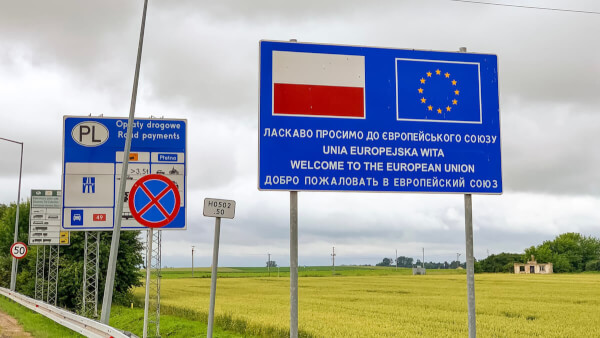Moving to Poland from the UK: Complete guide
Everything you need to know about moving to Poland from the UK. Read about visas, popular expat destinations, healthcare and more.

If you’re a UK expat living in Poland or considering moving there, you’ll need to get to grips with its tax system.
For people planning to retire in Poland or who have older relatives living there, it can be useful to know about how inheritance tax works there.
Here, we’ll cover all the essentials you need to know about inheritance tax in Poland. This includes rates, allowances and exemptions, as well as how to calculate and pay inheritance tax there.
This is very useful information, but it isn’t advice - it’s strongly recommended to get professional advice from a specialist in Polish tax law.
We’ll also show you how to send large amounts of money securely between countries using the Wise Account. This can be extremely useful if you have inheritance tax to pay, or want to send money from an inheritance back to the UK.
| Table of contents |
|---|
Inheritance tax, known as IHT in the UK, is a tax paid to the government on the estate of someone who has died. The ‘estate’ usually encompasses all property and possessions, as well as savings, investments and pensions.
Many countries have inheritance tax systems. Depending where in the world you are, the tax may be known as estate tax, inheritance tax or succession tax.
However, not all countries have this kind of tax in place. New Zealand, Singapore, Portugal and Canada are among a handful of countries which don’t charge inheritance tax at all.¹
Poland does have inheritance tax legislation, which applies on a national (rather than regional) level.
Unlike in the UK where inheritance tax is payable by the estate, in Poland it’s payable by each beneficiary individually.
Each person has a tax-free personal allowance, which is higher for close relatives . In fact, there’s a total tax exemption for most close relatives and immediate family members² - we’ll look at that in more detail later in this guide.
Beneficiaries will have to pay tax on anything they inherit above this threshold, with rates set in tiers according to the value of the inheritance and their relationship to the deceased person.
Polish inheritance taxes are payable on all assets and property located in Poland, no matter whether the deceased person was a Polish national or not.²
It’s also due when assets are located abroad, but are owned by either a Polish national or a foreign national resident in Poland for tax purposes.²
Each beneficiary will need to pay inheritance tax to the authorities. This is different to how it works in the UK, where a lump sum of tax is paid out of the estate.
It’s important to get professional tax advice to double check which country’s tax laws apply to you, especially if you live between countries or have property in multiple countries.
In the UK, a flat rate of tax is applied to estates valued over a certain sum. However, it works differently in Poland.
The Polish system uses tax rates which vary depending on the relationship of the beneficiary to the deceased, and the value of the inheritance.
Each beneficiary has a personal tax-free allowance, and will pay tax on inheritances above this threshold.
Here’s a quick look at the current inheritance tax rates and personal allowances in Poland:²
| Relationship to deceased | Personal tax-free allowance (PLN) | Value of inheritance (PLN) | Inheritance tax rate |
|---|---|---|---|
| Spouse, children, grandchildren, parents, grandparents, great-grandparents, great-grandchildren, siblings, step children | 9,637 | Up to 10,278 | 3% |
| 〃 | 〃 | 10,278 to 20,556 | 5% (+308.30 PLN) |
| 〃 | 〃 | 20,556+ | 7% (+822.20 PLN) |
| Siblings’ children and grandchildren, aunts, uncles | 7,276 | Up to 10,278 | 7% |
| 〃 | 〃 | 10,278 to 20,556 | 9% (+719.50 PLN) |
| 〃 | 〃 | 20,556+ | 12% (+1,644.50 PLN) |
| All other heirs | 4,902 | Up to 10,278 | 12% |
| 〃 | 〃 | 10,278 to 20,556 | 16% (+1,233.40 PLN) |
| 〃 | 〃 | 20,556+ | 20% (+2,877.90 PLN) |
While there is a tax bracket and applicable rates for close relatives, there is also a full tax exemption for beneficiaries in this category.
Under Polish inheritance laws, any assets located in Poland are considered to be taxable assets. Also, assets that are overseas but are owned by someone who is either a Polish national or resident in Poland for tax purposes.²
There is one major exemption, which relates to close relatives of the deceased person. Anyone considered to be in tax bracket 1 will be entitled to a total exemption from inheritance tax, meaning there’s nothing at all to pay to the Polish tax authorities. This is only if the donor (the deceased person) died after 1 January 2007.²
The following relations are classed as being in the tax 1 bracket:²
This means almost all close relatives are exempt from paying inheritance tax in Poland. But crucially, you must apply for the exemption within 6 months of receiving official confirmation that you’ve received an inheritance. If you’re late submitting your forms, you’ll have to pay tax according to the table of tax rates earlier in this guide.²
Here’s an overview of how Polish inheritance tax can be calculated:
If you are a beneficiary who is liable for inheritance tax in Poland, you must submit an inheritance tax declaration to Polish tax authorities within a certain time frame.
Which form you need and how long you have to submit it depends on whether or not you’re eligible for a tax exemption.
If you’re not eligible for an exemption, you must submit an SD-3 declaration within one month of the date a court declares you’ve acquired an inheritance. If there are other heirs, you must file an additional document - the SD-3A.²
Along with your SD–3 declaration, you must also provide documents which confirm:²
If you’re eligible for an inheritance tax exemption, the form you’ll need to submit is the SD-Z2. This needs to be submitted within 6 months of the court decision confirming your inheritance.²
Once you’ve submitted your forms, the revenue office will issue you a statement on how much tax is due. You’ll then have 14 days to pay it.²
You may need to contact the relevant Polish authorities to find out about accepted payment methods.
If you’re living in the UK or another country, a solution such as Wise could be ideal for sending a payment for inheritance tax to Poland. You can send money worldwide with Wise, for low fees* and mid-market exchange rates. There’s even a dedicated service for securely sending large amounts.
After reading this, you should have a better idea of how the Polish inheritance tax system works - and how it applies to you and your family. We’ve looked at personal allowances, rates, exemptions and who has to pay the tax.
We’ve also covered how to pay inheritance tax in Poland. If you need a way to pay inheritance tax, send inherited money back to the UK or generally manage your finances between countries - Wise is a great solution.
With Wise, you can hold and convert between 40+ currencies in your online account. And you can send money worldwide for low, transparent fees* and mid-market exchange rates.
If you’re sending a large sum between countries, read our quick guide on what documents you’ll need.
Whether you’re paying foreign bills or trying to get the best exchange rates when repatriating funds from overseas back to the UK, your Wise account can do it all.
Here are some of the most common questions:
When a person dies, Polish law dictates that the wishes for gifts and inheritance outlined in their will take precedence.
If there is no will, inheritances will be bestowed according to statutory inheritance laws - this follows a line of succession starting with spouses, children and close relatives.³
The 183 rule is used in Poland, as in many other countries, to determine tax residency. If a foreign national spends at least 183 days in Poland within the tax year, they’re considered a Polish resident for tax purposes during that year.
For beneficiaries of an inheritance, this means that Polish inheritance tax laws will apply to both assets in Poland and worldwide assets.
If you live in the UK and receive an inheritance from abroad - such as from a Polish relative, for example - it is likely to be UK inheritance tax laws that apply instead.
Tax can be extremely complicated, so it’s recommended to get expert tax advice on which country’s tax laws apply to you and what your obligations are.
Within the EU, the following countries have no inheritance taxes:⁴
Sources used:
Sources last checked on date: 25-Jul-2025
*Please see terms of use and product availability for your region or visit Wise fees and pricing for the most up to date pricing and fee information.
This publication is provided for general information purposes and does not constitute legal, tax or other professional advice from Wise Payments Limited or its subsidiaries and its affiliates, and it is not intended as a substitute for obtaining advice from a financial advisor or any other professional.
We make no representations, warranties or guarantees, whether expressed or implied, that the content in the publication is accurate, complete or up to date.

Everything you need to know about moving to Poland from the UK. Read about visas, popular expat destinations, healthcare and more.

The complete guide to buying property in Poland as a foreigner. Read about how to buy Polish property, average prices, fees, and more.

The government of Poland has opened its borders to refugees arriving from the ongoing war in Ukraine. So anyone who is escaping from Ukraine and reaches the...

Poland, as well as other EU member states on the border with Ukraine, opened on February 24, 2022 to receive refugees. The Government of Poland, state...

Everything you need to know about selling your property in Poland, including the process, fees, taxes and timescales.

The costs in Poland depend on the region and the city you’re moving to from the UK. Learn about average living prices when moving to Poland from abroad.